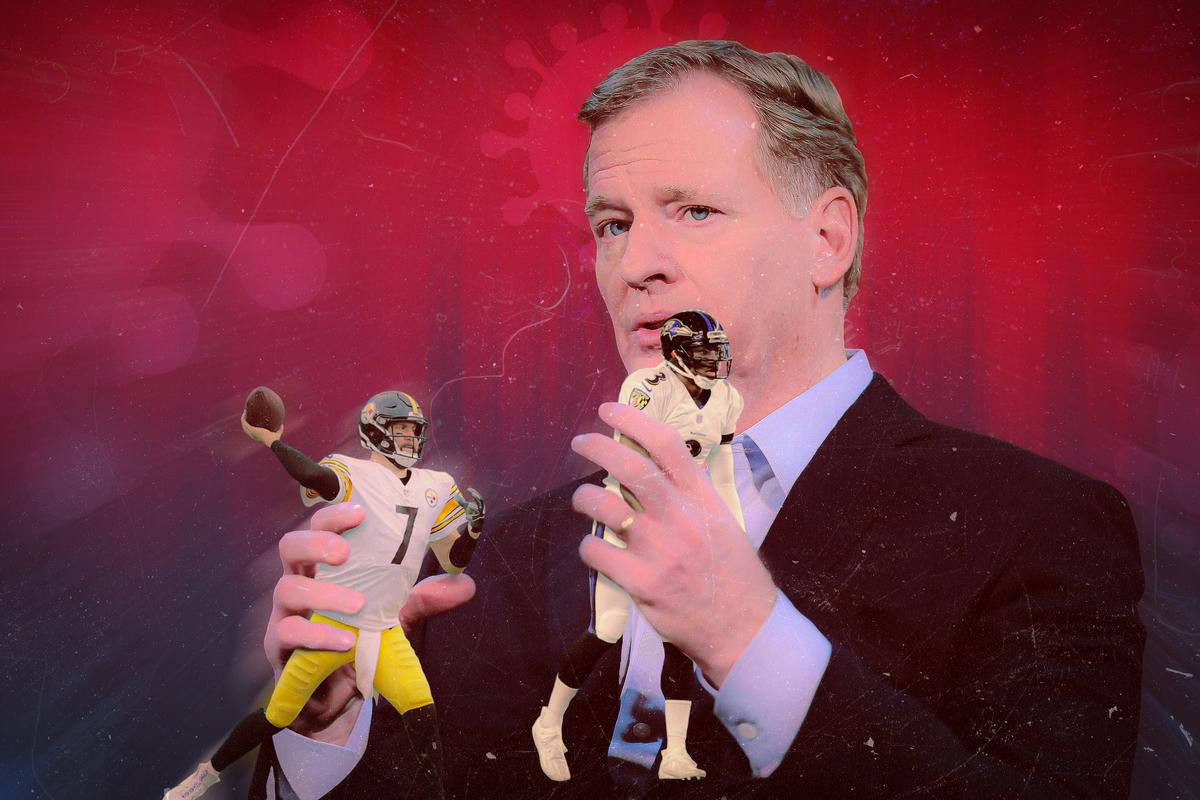
On October 13, as the Titans dealt with the NFL’s first significant COVID-19 outbreak, commissioner Roger Goodell sent a memo to teams drawing a line between competitive issues and medical concerns when explaining the league’s rationale when determining whether a game would be moved.
“Medical considerations and government directives will be paramount in determining when a game should be postponed,” Goodell wrote. “In light of the substantial additional roster flexibility in place for this season, absent medical considerations, games will not be postponed or rescheduled simply to avoid roster issues caused by injury or illness affecting multiple players, even within a position group.”
Essentially, Goodell was saying that while it might be unfair to play a game in which one team is missing a substantial chunk of its roster because of COVID-19, it’s not enough to move a game. It’s definitely not enough to cancel one—the idea of cancellation didn’t even come up in his memo. Heading into Week 13, with almost three-quarters of the season complete, the threshold for canceling a game has still not been defined.
If you watched the NFL this weekend—or plan to this week—you may have wondered what, exactly, that threshold might be. It was apparently not met in Sunday’s Denver–New Orleans game when Kendall Hinton completed one of nine passes for the Broncos. Hinton, a receiver for the Broncos’ practice squad, who started four games at quarterback for Wake Forest, was called up less than 24 hours before kickoff because every other quarterback on Denver’s roster was unavailable to play after testing positive or being exposed to COVID-19. Hinton had not met many of his coaches and teammates prior to Sunday because of social-distancing restrictions between players on the practice squad and those on the official roster. He was called up only after the NFL rejected the Broncos’ request to sign their offensive quality control coach, Rob Calabrese, who played quarterback at UCF from 2008 to 2010, to their active roster for the game. What the NFL didn’t do was move the game, so Hinton became the first non-quarterback to start an NFL game at the position since 1965, operating with about 10 percent of the playbook at his disposal.
For a moment, there was something fascinating about the game. It certainly had little precedent. Then the game started and curiosity turned into concern. The Broncos lost 31-3 to the Saints. They gained 112 total yards and only avoided a shutout thanks to a 58-yard field goal by kicker Brandon McManus. The game was both a competitive and aesthetic disaster; once it was over, New Orleans coach Sean Payton apologized to the cardboard cutout fans for having to witness it.
The problem with the Broncos-Saints game is not that it was a terrible or uneven game. The problem is that it could have been a lot worse. No matter how gracefully Hinton handled it or genuinely excited he was about playing, he was put in an unfair position. “You don’t know until you see it,” he said on Sunday about how fast NFL game speed really is. Any NFL player can get hurt in any game, but a quarterback who doesn’t know the checks or the calls at the line of scrimmage are at greater risk than most. Broncos running back Phillip Lindsay, who took snaps as wildcat quarterback, was injured Sunday. After the game, Broncos players said they felt the NFL put them in an unfair position by going forward with the game.
“To have to continue to play this game and not being given the chance to at least figure things out as far as our quarterback situation, that was definitely disappointing,” safety Kareem Jackson said.
Distinguishing between medical considerations and competitive ones, as Goodell did in October, sounds reasonable, until you realize that these are not binary choices in a contact sport. What happened in Week 12 sits squarely in the space where competitive concerns and safety ones overlap.
Which brings us to another game, between the Ravens and Steelers. The game was originally scheduled to be played in a prime spot on Thanksgiving night but was bumped to Sunday, then Tuesday, then Wednesday at 3:40 p.m. ET due to a COVID-19 outbreak inside the Ravens organization, which currently has 19 players on the reserve/COVID-19 list and has also infected multiple coaches and staff members.
That includes quarterback Lamar Jackson, who tested positive on Thanksgiving Day and is out for the Steelers game since Wednesday falls within the mandatory 10-day-minimum quarantine for a player with the virus. Robert Griffin III is expected to start in Jackson’s place, with practice-squad player Tyler Huntley likely to be called up as a backup unless Trace McSorley can come off the reserve/COVID-19 list in time for the game. Every spot on the offensive line, save for Orlando Brown Jr. at left tackle, is uncertain. The Broncos’ case was extreme because it decimated a single position group, but the game was played because the NFL felt comfortable that the outbreak had been contained through testing and contract tracing, leaving enough healthy players to field a team, no matter how inexperienced. The situation with the Ravens led to a postponement because, unlike the Broncos, contact-tracing efforts had not yet revealed the full extent of the outbreak. As of Sunday, Baltimore had had eight consecutive days with at least one positive test result.
And still, the game is on. According to the NFL Network, Monday’s postponement came after the Ravens held a players-only meeting and expressed concern about playing the game Tuesday after just one day of no new positive tests and without the chance to practice. Even with the domino effects of this latest postponement—the Steelers-Washington game, which was supposed to be Sunday, will now be played Monday at 5 p.m. ET, and the Ravens-Cowboys game, which was supposed to be this Thursday, will move to next Tuesday at 8:05 p.m. ET—the NFL could emerge from Week 13 back on schedule if there are no more issues, though that’s looking like a bigger and bigger “if.”
If this all seems like rearranging deck chairs on the Titanic, it’s worth understanding why the NFL is reluctant to adjust its course. The league is devoted to its schedule. It’s the product the NFL sells to the TV networks, with prime games in prime windows blocked off as carrots it can offer to favored partners. It gets its own release day, with prime-time specials and graphics packages. If the schedule could be doused with champagne like a new boat, the NFL would do it. Whether to appease broadcast partners, offer a vague sense of normalcy, or avoid moving the Super Bowl, the league has been steadfastly committed to completing the 2020 regular season with as little interruption as possible. That’s why you will see Kendall Hinton, or Robert Griffin III behind a green offensive line—it’s preferable to canceling games. Also, the league has complete control over the schedule. In November, owners passed a resolution that would expand the playoff field to 16 teams if games with meaningful playoff implications have to be cancelled, but so far, that escape hatch has gone unused.
Meanwhile, players are exhibiting signs of frustration and fatigue with the changing circumstances and feeling like they’re being batted around. The Ravens held their team meeting because they were uncomfortable with the idea of playing Tuesday. Broncos players like Jackson weren’t happy their game went on as scheduled. Neither was Drew Lock’s mother. On Sunday, 49ers running back Raheem Mostert broke down in tears during his postgame press conference, which took place not long after his team found out they needed to find a new place to play for the rest of the season due to a new three-week ban on contact sports in Santa Clara County. Mostert’s wife and two sons, one of whom is a newborn, are home in the Cleveland area to reduce their potential for exposure while he spends the season with the team.
“It’s been a struggle not having my little family,” Mostert said after a 23-20 win against the Rams. “Sorry if I get emotional, but it’s really tough, and I miss them so much.”
On Monday, the 49ers, the Cardinals, and the NFL worked out an agreement for San Francisco to play its remaining home games in Arizona at State Farm Stadium, even though the infection rate is twice as high there: Santa Clara county is averaging 26.8 cases of COVID-19 per 100,000; Maricopa county, where the Cardinals play, is averaging 48.6. The NFL is trying to complete its season amid rapidly rising infection numbers across the country, a trend that’s expected to intensify after Thanksgiving and through the rest of the holidays.
“It’s hard to really be confident when this thing seems to be spreading like wildfire,” Patriots special teams captain Matthew Slater said Monday.
The Ravens and Broncos might face disciplinary measures from the league related to the outbreaks in their organizations. The Ravens have disciplined a strength and conditioning coach who failed to report symptoms and didn’t always wear a mask or use a contact-tracing device when in the facility. The Broncos quarterbacks took their masks off during a film session they organized for themselves—they were all designated as high-risk close contacts after third-stringer Jeff Driskel tested positive. The NFL has levied harsh punishments against teams it has deemed to be negligent in maintaining COVID-19 safety protocols. On Sunday, it handed down fines to the Patriots and the Saints; the Titans, Raiders, and Steelers have also been punished this season.
The virus has put teams and players in situations simultaneously farcical and depressing. Bills rookie quarterback Jake Fromm has spent his first year in the NFL isolated from his teammates and getting coaching via Zoom just in case what happened in Denver happens in Buffalo. The Steelers have just one kicker on their roster, so coach Mike Tomlin brings another in for a tryout every week. That way, if Pittsburgh needs a backup, there’s one they can sign who has already gone through the five-day testing protocols. There are players living in hotels or, like Mostert, away from families. Much of this season has gone as planned, but in Week 12, the line between the ridiculous and the dangerous was blurred. What we know is that no team can reasonably expect to be virus-free this season. More games will likely need to be moved, and more fines to teams and coaches will probably be handed out. What we still don’t know is what it would take to cancel a game, or to substantially change the schedule by creating a Week 18. The problem with sticking to the schedule isn’t that some games have been terrible or unfair. It’s that they could still get a lot worse.

